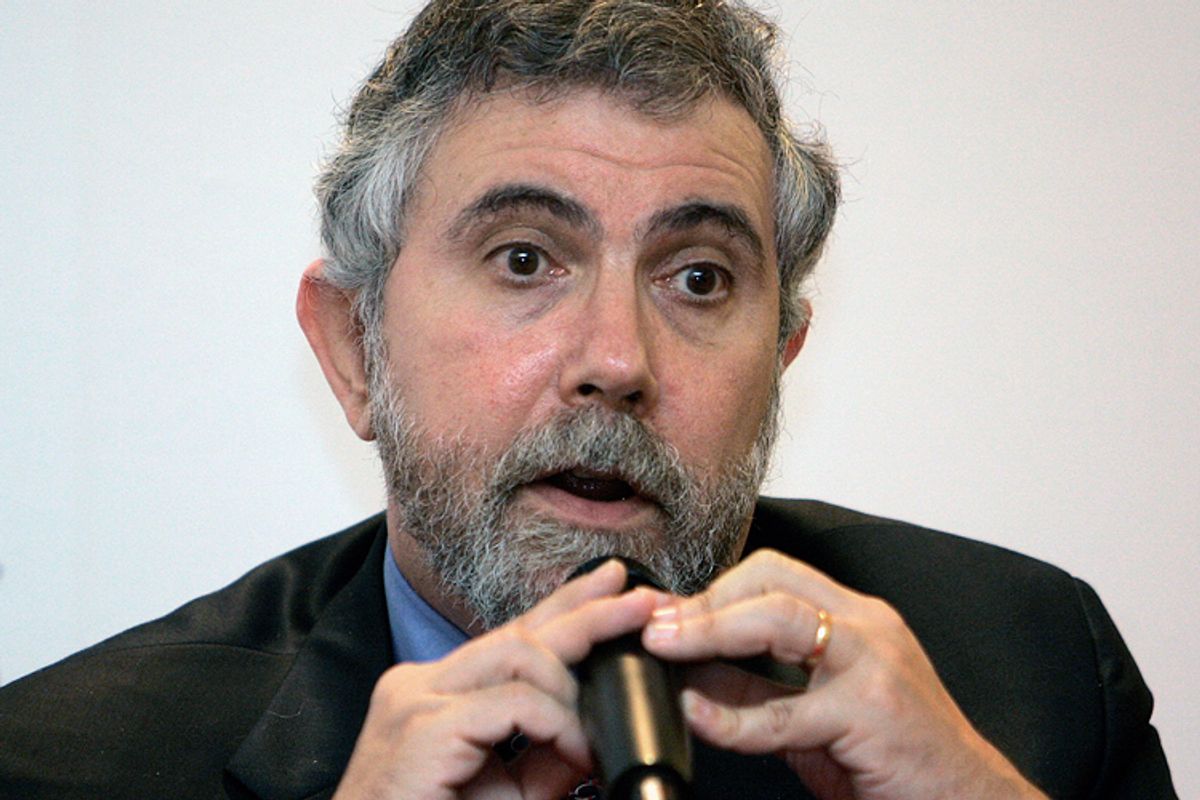In his latest column for the New York Times, liberal pundit and award-winning economist Paul Krugman returns to one of his favorite topics: Trying to understand hard-money conservatives and why, despite all the evidence, they're still pushing the line that massive inflation is just around the corner. Krugman calls these people "the deflation caucus," and ultimately argues that partisanship and class bias render their views on monetarism hopelessly self-interested and impervious to facts.
"And there but for the grace of Bernanke go we," Krugman writes at the beginning of his column, referencing the latest sign that the eurozone — which, unlike the U.S. did not embrace a post-recession policy of quantitative easing — remains in dire economic straits. "You can argue, and I would, that the Fed should have done even more," Krugman continues. "But Fed officials have faced fierce attacks all the way."
Krugman points an accusatory finger toward "[p]undits, politicians and plutocrats" whom for years, he claims, "warned that soaring inflation [was] just around the corner" and have not adjusted their belief in the wisdom of hard-money policy, despite much evidence to the contrary. "The predicted surge in inflation has never arrived," Krugman notes, "but despite being wrong year after year, hardly any of the critics have admitted being wrong, or even changed their tune." The question, Krugman writes, is thus two-fold: Why won't the deflation caucus change, and why do people take it seriously?
Krugman quickly acknowledges that partisanship plays a role (former Federal Reserve Chairman Ben Bernanke was a Republican, but he worked for years alongside President Obama); but he also believes that the usual squabbling between Republicans and Democrats can't be explanation enough for the deflation caucus. "Truthiness," which Krugman defines as a term "for things that aren’t true, but feel true to some people," is also to blame. But the biggest influence may be class:
Another answer is class interest. Inflation helps debtors and hurts creditors, deflation does the reverse. And the wealthy are much more likely than workers and the poor to be creditors, to have money in the bank and bonds in their portfolio rather than mortgages and credit-card balances outstanding. Back in the Gilded Age, the elite mobilized en masse to defeat William Jennings Bryan, who threatened to take the United States off the gold standard; campaign spending as a percentage of G.D.P. was far higher in 1896 than in any presidential election before or since. Are the wealthy similarly mobilized against easy-money policies today?
As far as I know, we don’t have rigorous evidence to that effect. There are certainly a lot of wealthy investors in the debasing-the-dollar crowd, but we don’t know for sure how representative they are — and you could argue that big investors should like the Fed’s expansionary policies, which have been very good for the stock market. But the wealthy may not trust that connection, in part because the inflationary ’70s were very bad for stocks. And we do know that the very wealthy are much more likely than the general public to consider budget deficits our biggest problem, even though fiscal austerity is probably bad for profits. So perceived class interest is probably also a key motivation for the deflation caucus.

Shares